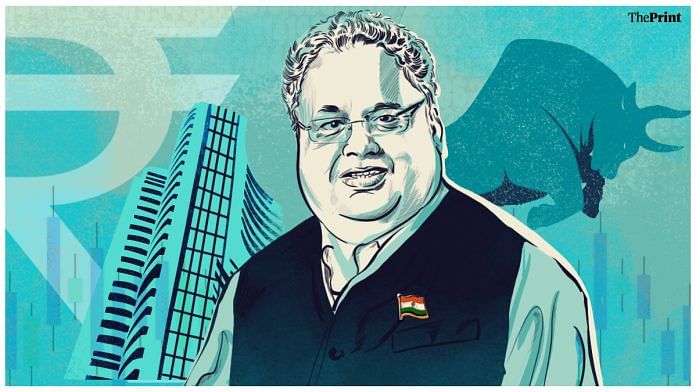Dosa-loving philanthropic billionaire Rakesh Jhunjhunwala – also a former investor with ThePrint – was the poster boy of Indian capitalism who, with his bullish investment strategies and success, became the buzzword in Mumbai’s Dalal Street. The pied piper of the stock market started out with Rs 5,000 in 1985 to become one of the country’s biggest investors, inspiring a generation of people to take the plunge.
His almost intuitive understanding of the financial market, scrutiny of financial statements of various companies, and willingness to spot and bet on new opportunities earned him sobriquets such as the ‘Big Bull’ and ‘India’s Warren Buffet’. Jhunjhunwala had a “special attachment” to cinema, and his forays into Bollywood were mostly successful. He co-produced the 2012 Hindi movie, English Vinglish, starring Sridevi. With a modest budget of Rs 20 crore, the film grossed Rs 84 crore worldwide. He produced two more films, Shamitabh (2015) and Ki & Ka (2016) and launched Hungama Digital Media (now Hungama Digital Media Entertainment) as an online promotion agency.
Few people have the place Jhunjhunwala has in the portals of the Indian stock market. By the time he passed away on 14 August 2022, his estimated net worth was $5.8 billion.
Also read: Rahul Bajaj believed all businessmen have a public life. They must engage with the govt
‘Investor with the Midas touch’
Jhunjhunwala’s story doesn’t quite fall into the romanticised ideal of the radical rags-to-riches story.
Born on 5 July 1960 in a middle-class Marwari family in Mumbai, he was introduced to trading and investing publicly at an early age by his father, Radheshyam Jhunjhunwala, an Income Tax officer.
Although his father never funded Jhunjhunwala’s stock-market ventures and forbade him from borrowing money from his acquaintances, he encouraged his interest and fed his curiosity for the markets. Jhunjhunwala excelled as a student and completed his Chartered Accountancy in 1985 from the Institute of Chartered Accountants of India, where he developed an interest in economics and finance education.
He made his first investment in 1986 by buying 5,000 shares of Tata Tea – and he did this at a time when Sensex traded at 150 points and not the 65,345 points it is at today. According to a Mint report, over the next three years, Jhunjhunwala earned nearly Rs 25 lakh from the shares he had once bought for Rs 43 each.
Jhunjhunwala was consistent when it came to investing in Tata group companies; he began with Tata Tea, went on to invest in Tata Power, Tata Motors, Tata Communications, Indian Hotels Company, and, of course, Titan – the big, sterling crown jewel that made him and his family the most wealth. According to Business Today, he owned stocks worth Rs 11,086.9 crore in Titan – roughly one-third (in terms of value) of his portfolio of 32 stocks. His other notable investments included Lupin, CRISIL, and Metro Brands.
At a time when he could have invested abroad, Jhunjhunwala stayed loyal to the Indian markets. The ‘investor with the Midas touch’ firmly believed in their potential even during periods of economic downturn.
Usually bullish as an investor, Jhunjhunwala was bearish during the Harshad Mehta days, when he made money by shorting stocks in the aftermath of the Securities Scam of 1992.
His enthusiasm for various subjects showed in his investments as well. His portfolio was extremely diverse, spanning 32 companies and multiple sectors, including jewellery, pharmaceuticals, banks and automobiles. Eventually, in 2003, he started his own company, RARE Enterprises, an asset management firm (AMC).
Also read: Bengal’s Ram Brahma Sanyal was Indian zoo pioneer in 1800s. Wrote handbook on care, breeding
‘Long-term’ investment philosophy
Jhunjhunwala never hesitated to share his investment strategies. As a regular guest on CNBC-TV18, he would share his investing philosophies and provide insights on the stocks he believed people should buy. One of his famous pieces of advice was to “buy when others sell, and sell when others buy.”
His other key investment mantra was to put money into financially sound companies with “strong and competitive” management for the best gains in the long run.
His “long-term” investment strategy even applied to philanthropy. “I treat charity as my fourth child and will divide my wealth equally among all my children,” said the stock market magnate who pledged to give away 25 per cent of his riches to causes he supported.
Jhunjhunwala was particularly interested in improving the country’s education sector, especially finance and economics. In February this year, Ashoka University honoured its late long-term investor by launching the Rakesh Jhunjhunwala School of Economics and Finance, dedicated to advancing “research on inclusive and equitable development”. Additionally, he was a trustee of Agastya International Foundation, a nonprofit that attempts to bring education to underdeveloped parts of the country. Jhunjhunwala even entered the EdelGive Hurun India Philanthropy List 2021 when he made an annual donation of Rs 50 crore.
As an investor, he understood the capricious and fickle nature of the future he betted on. “You are investing in the future; the future is uncertain. So you cannot make any prediction of profits to any precision,” he had said in a 2009 interview. His advice was simple: look at the opportunity, look at the people and look at competitive ability. It’s a lesson that holds true for life as well.
(Edited by Zoya Bhatti)



